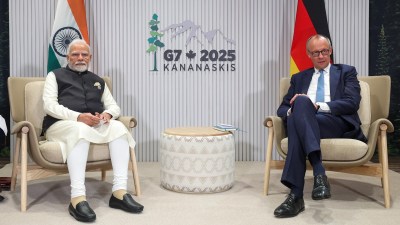A-G opinion poll: ban call is 100 unconstitutional
The demand to ban opinion and exit polls from across the political establishment was effectively buried today as Attorney General Soli Sorab...

The demand to ban opinion and exit polls from across the political establishment was effectively buried today as Attorney General Soli Sorabjee said the constitutionality of an ordinance to this effect was 8216;8216;highly debatable.8217;8217;
Sorabjee8217;s four-page opinion, on a reference made to him by Law Minister Arun Jaitley, comes as rebuff not only to all parties but also to the Election Commission, which proposed an ordinance to the Government on the basis of the all-party consensus.
Referring to the political support mobilised by the EC for the promulgation of such an ordinance, the Attorney General said: 8216;8216;Regard must be paid to the unanimous view of political parties but their view is not decisive on the question of constitutionality of a statute.8217;8217;
Rather than imposing a ban, as suggested by the EC, right from the time of the notification of the election, Sorabjee said that there could be 8216;8216;certain restrictions8217;8217; on the publication of opinion and exit polls.
But while citing examples of such restrictions all the way from Europe, Sorabjee lost sight of the eminently reasonable restrictions that were in force right in India in 1998-99:
8226; Permitting opinion polls subject to the restriction that their results not be published during the 40 hours preceding the actual poll when campaigning is anyway disallowed.
8226; Results of exit poll barred from being published till the last phase of polling is over.
| nbsp; |
Celebrate, we are not in
the North Korea league |
||||
| nbsp; |
Countries where opinion/exit polls are prohibited 8226; China, North Korea banned Countries with no restrictions 8216;Reasonable restrictions8217; |
nbsp; | |||
The EC was forced to withdraw these 8216;8216;guidelines8217;8217; during the last Lok Sabha elections in September 1999 as the Supreme Court asked how they could be enforced in the absence of statutory sanction.
Without examining any of the guidelines mentioned above, Sorabjee cited the Council of Europe8217;s recommendation on an issue that never really arose in the context of the Indian media. He said those who publish an opinion or exit poll should be legally required to name the political party or other organisations or persons which commissioned the poll and paid for it.
Another restriction recommended by Sorabjee covered a practice that is already very much in existence. He said the opinion poll or the exit poll should reveal the identity of the organisation conducting the poll, the methodology employed therein, the size of the sample, the margin of error and the date and period in which the poll was conducted.
Sorabjee was, however, thorough in demolishing the EC8217;s ban proposal on the constitutional plane. He said 8216;8216;a serious and formidable objection to the proposed ordinance is that it would be violative of Article 191a of the Constitution,8217;8217; which guaranteed to each citizen the right to receive as well as disseminate information. As for the timing of the proposed ordinance, Sorabjee pointed out that such polls have been conducted for many years and therefore 8216;8216;it was difficult to conclude that circumstances impel the necessity for urgent and immediate action for the issuance of an ordinance.8217;8217;
- 01
- 02
- 03
- 04
- 05































